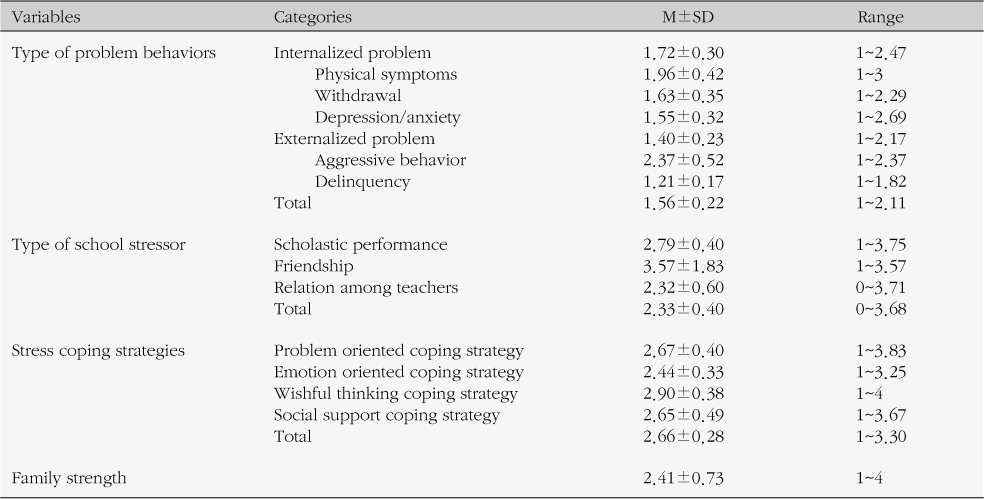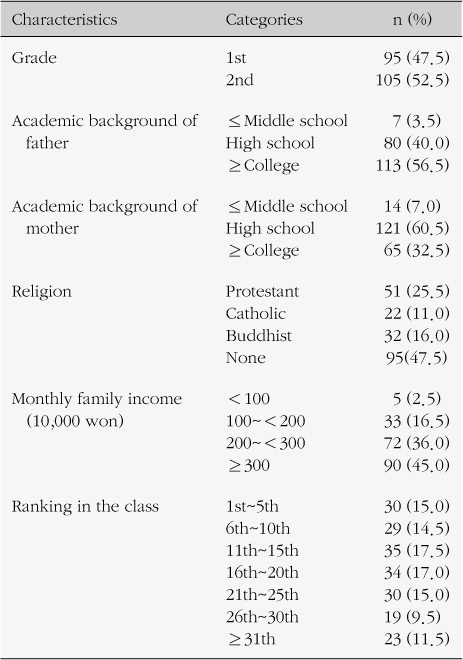Articles
- Page Path
- HOME > J Korean Acad Community Health Nurs > Volume 22(3); 2011 > Article
-
Original Article
- Factors related to Problem Behaviors in High School Girls
- Yeon-Hwan Park, Hye-Jin Hyun, Su Jeong Yu, Do-Hwa Byen
-
Journal of Korean Academy of Community Health Nursing 2014;22(3):315-324.
DOI: https://doi.org/10.12799/jkachn.2011.22.3.315
Published online: April 4, 2014
1Associate Professor, College of Nursing & The Research Institute of Nursing Science, Seoul National University, Korea.
2Professor, Department of Nursing, Kangwon National University, Korea.
3Associate Professor, Department of Nursing, Sangji University, Korea.
4Lecturer, Samcheok Nurseaid Education Center, Korea.
© 2011 Korean Academy of Community Health Nursing
This is an Open Access article distributed under the terms of the Creative Commons Attribution Non-Commercial License (http://creativecommons.org/licenses/by-nc/3.0/) which permits unrestricted non-commercial use, distribution, and reproduction in any medium, provided the original work is properly cited.
- 700 Views
- 1 Download
- 5 Crossref
Abstract
-
Purpose
- The purpose of this study was to investigate the relationships between problem behavior, school stressor and family strength in high-school girls.
-
Methods
- Data were collected from 200 high school girls in 2008. Data were analyzed with SPSS/WIN 18.0.
-
Results
- There was a positive correlation between problem behavior and school stressor. There was a negative correlation between problem behavior and family strength. The predictors of problem behavior were school stressor, family strength, and monthly family income and these factors explained 43.0% of problem behavior.
-
Conclusion
- The findings of this study suggest the necessity of developing nursing intervention programs for enhancing high-school girls' skills in interpersonal relationship and communication to decrease school stressor and increase family strength.

-
This study was supported by research fund of Health Care Research Center in Kangwon National University.
NOTES
- 1. Ahn HY, Yi G. A Correlational study of adolescents behavior and mothers childrearing attitude with child abuse experience of the adolescents. J Korea Community Health Nurs Acad Soc. 2002;13(4):786–794.
- 2. Baer J. Is family cohesion a risk or protective factor during adolescent development? J Marriage Fam. 2002;64(3):668–675. Article
- 3. Ban ES. A study on the factors of influencing on adolescent's problematic behaviors -focused on the viewpoint of ecosystem-. Cheongju: Cheongju University; 2009. Unpublished master's thesis.
- 4. Bonica C, Daniel JH. Helping adolescents cope with stress during stressful times. Curr Opin Pediatr. 2003;15:385–390. ArticlePubMed
- 5. Han HA. The effects of family rist factors, egoresilience and quality of peer relationships on adolescent problem behaviors. Seoul: Ewha Womens University; 2007. Unpublished master's thesis.
- 6. Hyun MS, An YM, Nam KA, Park SW. The school related stress and mental health education need among the middle school students. J Korean Acad Psychiatr Ment Health Nurs. 2005;14(2):119–126.
- 7. Hyun MS, Nam KA, Kong SS. A study of relationship between adolescents' sexual development and problem behavior and depression -focused on middle school students in Kyungki-Do-. J Korean Acad Psychiatr Ment Health Nurs. 2001;10(4):533–547.
- 8. Hyun MS, Kim KH, Kim SA. Influencing factors on problem behaviors among adolescents: Focused on middle school students in seoul. J Korean Acad Nurs. 2004;34(2):252–260. ArticlePubMedPDF
- 9. Hwang JS, Lee EH, Na YJ, Koh SJ, Park SH. Cyber behavior of adolescents according to family and school factors. J Korean Home Econ Assoc. 2004;42(11):223–235.
- 10. Kim JK, Kim ES, Lee JA. A study about the experienced problems and the demands of counseling of the adolescents according to the physical, psychological, sexual and the socio-cultural problem categories. J Korea Community Health Nurs Acad Soc. 1997;11(2):152–170.
- 11. Kim SJ. (A) study on the influences of the stressors from school on problem behavior in middle school and high school students: Focusing on the stress coping strategies. Seoul: Yonsei University; 2002. Unpublished master's thesis.
- 12. Kim SJ, Lee CS, Kweon YR, Oh MR, Kim BY. Test of validity and reliability of the adolescent mental problem questionnaire for korean high school students. J Korean Acad Nurs. 2009;39(5):700–708. ArticlePubMed
- 13. Ko JJ. The effects of the individual and family relational variables perceived by adolescents on adolescents' problem behaviors. J Korean Home Econ Assoc. 2003;41(7):121–143.
- 14. Kwak YH. (The) difference in the perception of adolescent's behavioral problems between high school students and their parents. Gwangju: Chunnam National University; 2002. Unpublished master's thesis.
- 15. Lee CS, Choi BS. A study on mental health of middle school students in a city. J Korean Acad Psychiatr Ment Health Nurs. 2001;10(4):615–628.
- 16. Lee KA, Chung HH. Effects of stress, self-esteem and student-teacher relationship on adolescent school adjustment. Korean J Couns Psychother. 1999;11(2):213–226.
- 17. Lee SC. The understanding frameworks for adolescent's specific behavior. Korean J Psychol Soc Issues. 2004;10:1–10.
- 18. Mahon NE, Yarcheski A, Yarcheski TJ, Hanks MM. A meta-analytic study of predictors of anger in adolescents. Nurs Res. 2010;59(3):178–184. ArticlePubMed
- 19. Moon YS. The effects of parent-adolescent communication on self-concept and problem behavior. J Korean Acad Child Health Nurs. 2008;14(4):405–414.
- 20. Nam KA, Cho Chung HI, Hyun MS, Noh SH. A correlation study among family function, occurrence and perceived seriousness of problem behaviors for female middle school students. J Korean Acad Psychiatr Ment Health Nurs. 2006;15(2):161–169.
- 21. Park YJ, Han KS, Shin HJ, Kang HC, Moon SH. Anger, problem behaviors, and health status in adolescent women. J Korean Acad Nurs. 2004;34(7):1234–1242. ArticlePubMedPDF
- 22. Park YJ, Lee JH. The effect of academic stress on the binge eating disorder among Korean girls' high school students-with the mediation of self-esteem. Korean J Sch Psychol. 2009;6(2):171–187. Article
- 23. Preechawong S, Zauszniewski JA, Heinzer MM, Musil CM, Kercsmar C, Aswinanonh R. Relationships of family functioning, self-esteem, and resourceful coping of Thai adolescents with asthma. Issues Ment Health Nurs. 2007;28(1):21–36. ArticlePubMed
- 24. Seiffge-Krenke I, Aunola K, Nurmi JE. Changes in stress perception and coping during adolescence: The role of situational and personal factors. Child Dev. 2009;80(1):259–279. ArticlePubMed
- 25. Shapiro R, Siegel AW, Scovill L, Hays J. Risktaking patterns of female adolescents: What they do and why. J Adolesc. 1998;21:143–159. ArticlePubMed
- 26. Statistics Korea. Youth Statistics 2008;Retrieved April 7, 2011. from: http://kosis.kr/themes/themes_03List.jsp
- 27. Torsheim T, Aaroe LE, Wold B. School-related stress, social support and distress: Prospective analysis of reciprocal and multilevel relationships. Scand J Psychol. 2003;44:153–159. ArticlePubMed
- 28. Torsheim T, Wold B. School-related stress, support, and subjective health complaints among early adolescents: Multilevel approach. J Adolesc. 2001;24:701–713. PubMed
- 29. Yu HJ. The effects of the family function and internet addiction on the problem behaviors of the youth. Seoul: Soongsil University; 2009. Unpublished master's thesis.
- 30. Yun HY, Kim NY. The stresses depression, and family strength of parents according to the types of disabilities of their children. J Dev Disabil. 2002;6(2):59–71.
Figure & Data
References
Citations

- The Effects of Life Style Modification on Constipation of the Older Adults at a Geriatric Hospital
Ho-Suk Kang, Inja Kim
The Korean Journal of Rehabilitation Nursing.2017; 20(1): 52. CrossRef - Influencing Factors on Externalized and Internalized Problem Behaviors among Adolescents: Focused on First Grade High School Students
Mi-kyung Yun, Eunyoung Park, Jung-A Son, Myung Sun Hyun
The Journal of Korean Academic Society of Nursing Education.2016; 22(2): 152. CrossRef - Factors Influencing Suicidal Ideation in Girls' High School Students
Gab-Yeon Kim, Hee-Sook Kim
The Journal of Korean Academic Society of Nursing Education.2016; 22(3): 366. CrossRef - The Effect of Self-esteem on Resilience and the Mediating Effect of School Satisfaction : A First Year Female Students in High School
Heewook Weon, Jiyoung Lim, Hae Kyoung Son
Journal of the Korea Academia-Industrial cooperation Society.2015; 16(4): 2684. CrossRef - A Study of the Relationship between Anger Thought And Problem Behavior in Perfectionist High School Girls.
So Hyun Moon, Hun Ha Cho
Child Health Nursing Research.2014; 20(4): 332. CrossRef

 KACHN
KACHN



 PubReader
PubReader Cite
Cite

